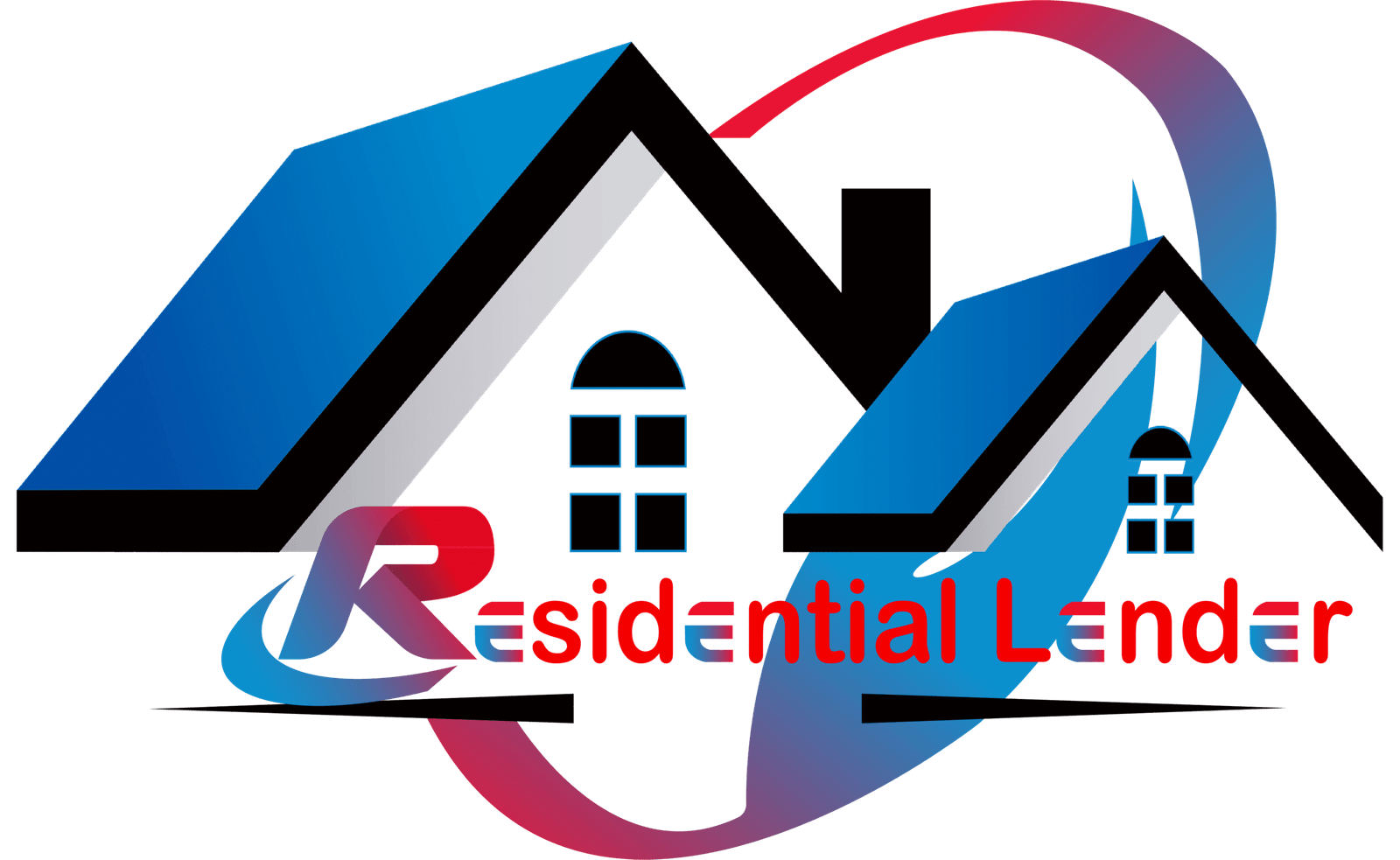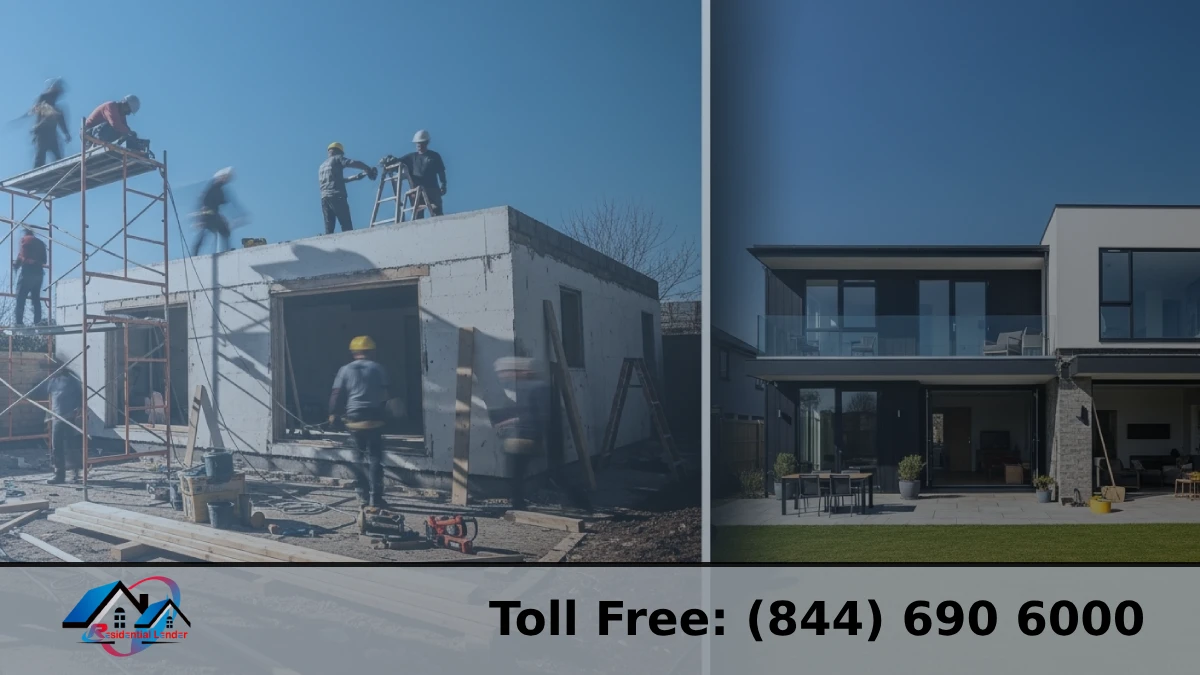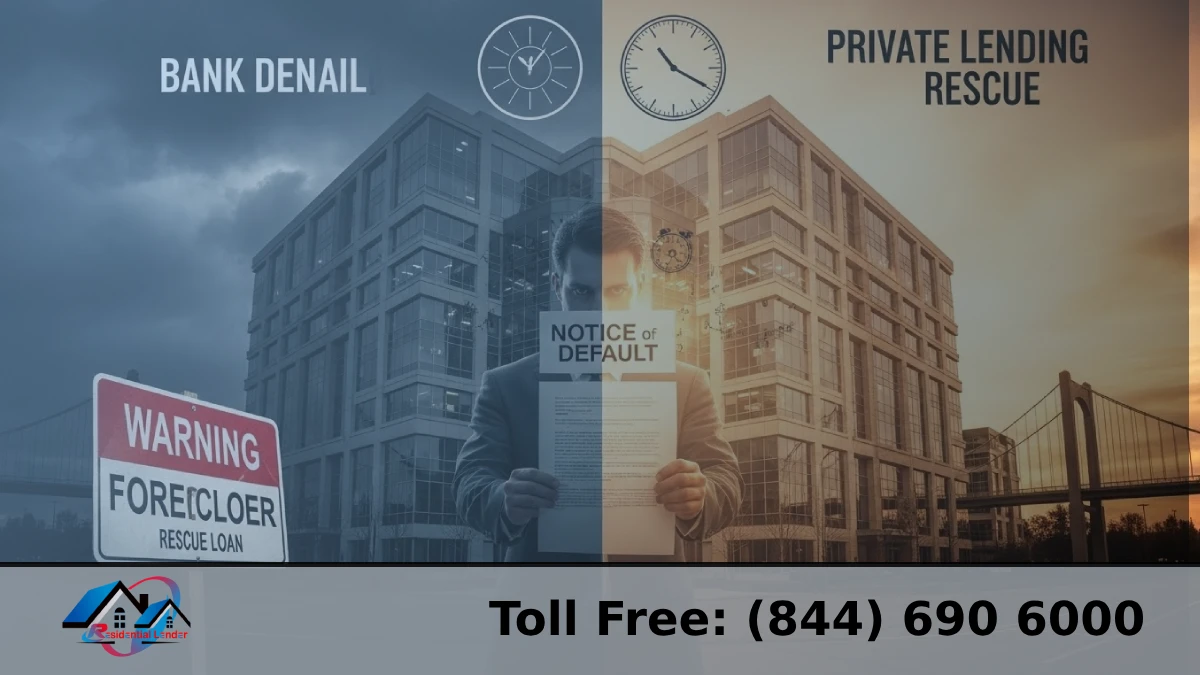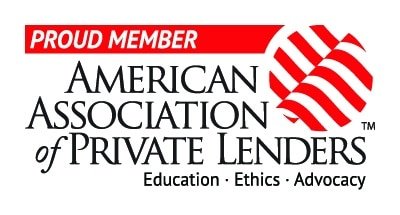High interest rates on hard money loans can be a significant issue for individuals seeking to invest in residential real estate, and the standard loan process can be frustrating. Imagine that you need money quickly to capitalize on a good business opportunity. Still, you’re unable to do so because of paperwork and lengthy approval processes. Hard money loans are a quick, asset-based way to get the money you need for real estate projects when other options don’t work.
Hard money loans are often thought of as having “high interest rates,” but that’s not always the case. The goal of this blog is to bust that myth. We’re a home lender with 30 years of experience in underwriting and an extensive network of 200 private lenders and investors. This makes us the ideal partners to help you secure favorable hard money loan terms.
The 7 helpful tips in this blog post will help real estate owners understand “hard money loan interest rates” and get the best terms for their “short-term loans” and other investments in real estate. Discover how to use hard money to your advantage by first comprehending “hard money loan interest rates.”
What Influences Hard Money Loan Interest Rates?
“Hard money loan interest rates” are not based on your credit score, unlike those of traditional loans. Instead, they are based on the property being used as collateral and the project’s overall viability. This fundamental difference is crucial for individuals seeking to invest in real estate.
“Private investors” and “money lenders” charge “higher interest rates” to make up for the higher risk, the lightning-fast funds, and the lazier borrower requirements they have compared to a “traditional lender.” They are working on projects that most banks won’t touch, and the extra risk needs to be balanced out. Investors can take advantage of opportunities that require immediate action, as they can access cash quickly. For many, the higher cost is worth it.
Here are the key determinants that influence “hard money loan interest rates”:
- Loan-to-Value (LTV) Ratio: This is the most important thing. “Loan to value LTV” shows how much the loan is compared to how much the property is worth. Lower LTV means the borrower has more wealth in the home, which usually means better “money loan rates.” LTVs between 60% and 75% are typically what hard money lenders prefer, as they provide them with more flexibility in case of a loss. The LTV for a house worth $200,000 with a loan amount of $120,000 would be 60%.
- Property Type and Condition: The type of property and its current condition have a significant impact on its perceived risk. There are different levels of risk associated with “fix-and-flip,” “fix-and-hold,” “fix-and-rent,” “mixed-use,” and “multifamily” projects. “Interest rates on hard money loans” can be lower for properties that are in better shape or have a clearer exit plan, like a quick flip in a hot market. This is because the lender thinks there is a lower chance of default and a faster return on their investment.
- Borrower Experience: An experienced “real estate investor” with a history of good projects makes the borrower look less risky to lenders. They can often get better “interest rates on hard money loans” and even better terms on fees because they have a past of successful flips or rentals.
- Loan Term: “Short-term loans” with terms of 6 to 24 months are what hard money is all about. The length of the “loan term” has a direct impact on the “hard money loan interest rate.” Lenders typically prefer shorter terms because they protect them from market fluctuations and project delays.
- Geographic Location: Rates can also be affected by the state of the local market and the number of lenders competing in a particular area. When there are numerous hard money providers in a market, rates may be slightly higher.
“Why hard money loan interest rates are higher” and “how hard money loans work” are two things that shed light on the value offered. At first glance, the “typical hard money loan terms” may seem complicated. However, investors can stand to gain the most advantageous rates by understanding these fundamental factors.
Tip 1: Optimize Your Loan-to-Value (LTV) Ratio
A high “loan-to-value LTV” number is likely the most important thing you can do to get reasonable “hard money loan interest rates.” How does it work? The “money lender” can offer better terms if they take on less risk. When you have a significant stake in the property, the lender has less to lose. This means they view you as a lower risk and offer you a better deal.
To improve your LTV and get better rates, try these useful strategies:
- Larger Down Payment: This is the easiest way to lower your LTV. You can instantly lower the “loan amount” you need by putting more of your own money into the business upfront. For example, if you put down $60,000 on a $200,000 house, your LTV is 70% ($140,000 loan / $200,000 worth). A larger down payment demonstrates that you are committed and have sufficient funds, making you a more appealing renter.
- Accurate Property Valuation: After Repair Value (ARV): Make sure that your ARV for the “investment property” is reasonable and backed up by evidence. If you lie about the ARV, the lender may ask for a bigger “loan amount,” which will raise your LTV and make your plan less appealing. To obtain a conservative yet accurate valuation, work with experienced appraisers and conduct thorough market research to ensure a precise assessment. This makes sure that the “property being used as collateral” is valued correctly.
- Demonstrate Value-Add: For “fix-and-flip” or “fix-and-rent” homes, ensure you clearly explain the specific changes you intend to make and how they will impact the property’s value. Provide particular job descriptions, estimated costs, and similar sales to support your ARV. Once lenders see how the changes you want to make will raise the property’s value, they have more faith in the project’s success and your ability to pay back the loan. This means that you can get better terms for your “real estate investments.”
In a psychological sense, lenders feel safer if they know you have a significant financial stake in the property. Your goals become very similar to theirs: a good project means that they can repay their loan, and you can make money. This shared reward helps people trust one another, making it easier for them to borrow money.
Tip 2: Showcase Your Experience and Track Record
For “private investors” who are giving hard money, a client who is an experienced real estate investor is a safer bet. The property itself is the primary collateral, but how well you’ve done in the past also says a lot about your ability to complete a project and pay back the loan. Having a good credit history can have a significant effect on the interest rates you’re offered on a loan.
To lenders, here’s what you should stress:
- Previous Projects: Make a short resume of the things you’ve done well. Here, you should list the most recent fix-and-flip, fix-and-hold, or fix-and-rent deals. Make a list of the project’s start date, initial investment, total cost, and end profit for each. Quantifiable success stories demonstrate that you can deliver on your promises, which makes you appear less risky to the lender.
- Financial Stability: Even though hard money loans are primarily based on assets, showing lenders that your general finances are in good shape can give them more confidence in you. This doesn’t mean they want perfect credit scores; they want a general idea of how to run a business responsibly. It doesn’t have a direct effect on the loan terms like LTV does, but it makes you seem more reliable as a customer.
- Strong Exit Strategy: Clearly outline how you will repay the short-term loans. How quickly can I sell a fix-and-flip home? When the repairs are done, will you switch to a traditional loan with a longer term? Or will the rent from a fixed-and-rent house be enough to pay off the loan? An exit plan that is clear and attainable demonstrates foresight and reduces risk for the lender, thereby protecting their investment.
Psychologically, lenders want to see a clear and practical repayment plan for borrowers. A history of great projects directly lowers the risk that a project will fail. Because they have more faith in your ability to run the project and repay their money, they are much more likely to offer competitive interest rates on hard money loans.
Tip 3: Craft a Comprehensive Real Estate Investment Strategy
Getting the best “hard money loan interest rates” requires more than just having a valuable “property being used as collateral.” You must also show a carefully thought-out and thorough project plan. Lenders want to see a clear plan for success that shows you’ve thought about all the parts of your “real estate investments.”
These are the most essential parts of a sound investing plan:
- Detailed Rehab Budget & Timeline: For “fix-and-flip” or “fix-and-rent” projects, list all the prices of repairs and renovations. This should include the costs of supplies, labor, permits, and any other associated expenses. A realistic deadline for finishing is just as important. Lenders want to know that you understand what needs to be done and have a plan that can be implemented and maintained. This directly affects the “loan term” and the amount of risk they are taking. Lack of clarity in these areas can indicate a lack of knowledge and increase the risk that someone is taking.
- Market Analysis: Show that you know a lot about the market where your “investment property” is located. To support your After Repair Value (ARV), include thorough comparable sales (comps) and, if necessary, a detailed rental demand analysis to substantiate your “fix-and-rent” plan. For lenders, this demonstrates that your financial estimates are grounded in the actual market, rather than optimistic projections.
- Contingency Planning: Every project has unexpected problems that arise. Show lenders that you’ve thought about what could go wrong, like fix costs that you didn’t expect, delays in getting the permit, or changes in the market, and that you have a clear backup plan. This demonstrates that you are intelligent and resilient, and it reassures the investor that you can effectively manage challenges without compromising their investment.
- Profit Projections: Clearly define your projected returns. This includes both how much money you could make from a sale and how you plan to pay back the loan by the end of the agreed-upon “loan term.” Lenders can determine whether the project will be successful and whether you can repay the loan if you provide them with clear and realistic profit expectations.
Lenders perceive significantly less risk when a well-thought-out plan is in place. Your level of skill is clear from this. As long as the lender is sure that you can complete the job and pay back the loan, they are much more likely to offer better “hard money loan interest rates.” To understand “how money loans work” in your favor, you need to take this all-around method.
Tip 4: Compare Multiple Lenders – Our Network Advantage
Understanding that hard money loan interest rates are not all the same is one of the most important things you can do to get good terms for your real estate purchases. They may vary significantly from one provider to the next. If you accept the first offer you get, you’ll be losing money and adding to an interest rate that is higher than it needs to be.
When reviewing offers, consider more than just the interest rate. Take a look at these other things that affect the total loan amount:
- Origination Fees and Points: These are fees that you pay upfront, typically ranging from 1% to 5% of the loan amount. You pay them straight to the lender or broker. One “point” is equal to 1% of the loan amount. A lower purchase fee might come with a slightly higher interest rate, and vice versa. This is something that can be negotiated. It is essential to know how these fees affect the total cost of the loan.
- Prepayment Penalties: Some hard money lenders may include terms in their short-term loans that prohibit early repayment. This is because lenders get paid back in interest over the life of the loan. You might lose some of the money you save from a lower interest rate if you pay off the loan early. Always ask about these fines and how they are determined.
- Loan Terms and Flexibility: Hard money loans typically have shorter terms (6–24 months), but it’s essential to verify the exact term, any available options for extensions, and the flexibility of the payment plans. Some lenders may be able to offer loan terms that are better suited to your project’s needs.
- Closing Costs: In addition to the purchase fee, there are other closing costs to be aware of, including appraisal fees, legal fees, title and escrow charges, and underwriting fees. These things can add up and have a significant impact on the actual cost of your support.
Our Solution – Network of Private Investors: This is an area where our company has a significant edge. Instead of trying to find your way around the complicated world of hard money loans by yourself, we’ve built an extensive network of 200 private lenders and investors over the past 30 years. Because of this one-of-a-kind connection, we can quickly and easily shop around for you. We are familiar with the specific requirements of each lender. We can put you in touch with the ones who are most likely to give you the best “hard money loan interest rates” and terms for your project.
Investing can be scary for some people because they worry about secret fees or not getting the “best deal.” Our extensive network directly addresses this concern by providing you with a wide range of choices. This makes things clear and gives you the power to make an informed decision without having to check out dozens of lenders one by one, which is a common problem with traditional loans.
Tip 5: Understand and Negotiate Loan Terms
In contrast to “traditional loans,” which have stringent terms, hard money loan terms are often very flexible. This means that real estate buyers need to be able to negotiate well. A tenth of a percentage point cut from “interest rates on hard money loans” or a slight drop in fees can result in significant savings over the life of the loan.
You should be ready to discuss the following:
- Interest Rate: This is where the bargaining is most clear. A quarter or half-percentage point can make a big difference in the amount of money you borrow and how much money you make, especially on bigger payments. Don’t be afraid to use offers from other lenders that are competitive as pressure.
- Points and Fees: Origination points, which are 1% of the loan amount, and other management fees are familiar with hard money loans. These upfront costs have a significant impact on your actual costs. If you have a substantial project and a strong track record, consider negotiating for these points to be waived or for specific fees to be reduced.
- Loan Term: With hard money, you can only get “short-term loans,” but if your job takes longer than expected, you might be able to work out a slightly longer loan term. For example, if the standard term is 12 months but your project requires 15, consider asking about extending the term upfront instead of having to pay for expensive extensions later.
- Draw Schedules: The draw plan outlines projects’ timelines and funding requirements for tasks such as building or renovating homes. Talk about a draw plan that works with the milestones of your project and your cash flow needs. A well-organized draw plan can help you avoid waiting and worrying about money, ensuring you have the necessary funds for materials and labor when you need them.
- Exit Fees: Paying off the loan may incur fees, which are sometimes referred to as “prepayment penalties” or “exit fees.” Hard money loans are less likely to have them than standard loans with longer terms, but some lenders may still offer them. You should understand how they are determined and attempt to have them lowered or removed, especially if you plan to sell your investment property quickly.
Our Role as Financial Consultants: Our “financial consulting services” come in very handy here. We can help our clients understand these complex terms because we have been underwriting loans for 30 years and have extensive knowledge about how hard money loans are structured. Our job is to represent you and negotiate on your behalf to get the best interest rates and terms for hard money loans. Our goal is to ensure you get a deal that truly fits your budget and maximizes your return on investment.
Tip 6: Build a Relationship with Your Lender
A good bond with your “money lender” lasts longer than just one transaction. For a “real estate investor,” having repeat business and a good image can lead to much better terms on future “real estate investments,” such as lower “hard money loan interest rates.”
Here’s how to build that critical relationship:
- Be Transparent: Maintain open and honest communication throughout the entire loan process and project duration. If challenges arise, inform your lender promptly.
- Perform as Promised: Execute your project diligently and by the plan you presented. Meeting your projected timelines and budgets builds immense trust.
- Timely Payments: Consistently making your payments on time demonstrates reliability and financial discipline, which are highly valued by “private investors.”
Because we have long-term relationships with 200 “private lenders” and an extensive network of contacts, we can often recommend borrowers you can trust. This existing trust between us and the lenders can result in better terms for our clients from the outset, as we’ve already proven our worth on their behalf.
Tip 7: Consider a Hybrid Approach and Explore Other Loan Options
Real estate investors can get much help from “hard money loans,” which offer speed and freedom that “traditional loans” can’t match. However, it’s essential to remember that these loans may not always be the best or only option for financing a project. Someone knowledgeable about investing is aware of all their options.
Consider hybrid tactics that utilize hard money as a strategic bridge. For example, you could use a “hard money loan” as a “bridge loan” to quickly purchase and renovate an “investment property.” You could refinance the property into a “long-term” traditional loan, like a “DSCR loan” (Debt Service Coverage Ratio) created for rental properties, once it is stable and making money. This allows you to utilize the speed of hard money initially, then transition to more traditional, lower-interest loans for the long term.
This is where our clients truly benefit from our comprehensive range of skills. It’s not just “hard money loans” that we offer; we’re also a full-service “correspondent lender” and “table lender” with a wide range of financial options for “real estate investments.” What we have to offer is:
- Bridge loans
- DSCR loans
- USDA B&I loans
- SBA loans
- FHA commercial property investment loans
- Construction loans
- Term loans
- No-doc loans
- Lite-doc loans
- State income loans
- And many more specialized financial products.
Our “financial consulting services” are made to help both new investors who want to get into real estate and experienced investors who want to grow their businesses. We take the time to learn about your long-term goals, your budget, and the specifics of your job. We can then get the best loan for each “investment property,” whether it’s a “short-term loan” from our hard money options, a brilliant mix of financing, or a straight route to a “traditional lender” product. We ensure you have access to the optimal capital structure, enabling you to achieve the best results from your investments and reach your investment goals.
Conclusion
Plan to get the best interest rates on hard money loans if you want to be a successful real estate owner. You can get a lot cheaper loans if you maximize your Loan-to-Value (LTV), show that you have experience, come up with a reasonable investment plan, compare multiple lenders carefully, and learn how to negotiate like a pro. You can also use hard money to invest in real estate effectively if you build good relationships with lenders and explore different types of financing.
If you want to buy a rental home, don’t let the thought of a high interest rate stop you. We have Residential Lenders ready to help you with your money. They have been underwriters for 30 years and have an extensive network of private loans and investors. For both new and experienced agents working with various types of rental homes, we offer referral programs. Talk to us right away, and we’ll help you find the best loan rates to get what you need.
FAQs
How quickly can a hard money loan close compared to a traditional loan?
One of the most significant advantages of hard money loans is their speed and efficiency. While traditional loans can take anywhere from 30 to 60 days, or even longer, to close due to extensive underwriting and documentation requirements, hard money loans typically close much faster. Depending on the lender and the specifics of the deal, hard money loans can often close in as little as 5-10 business days, making them ideal for time-sensitive real estate investment opportunities.
Can I use a hard money loan if I have bad credit?
Yes, hard money loans are often an excellent option for borrowers with less-than-perfect credit. Unlike traditional lenders who heavily scrutinize credit scores and financial history, hard money lenders primarily focus on the value and potential of the collateral property and the viability of your investment plan. While a good credit score can sometimes help with rates, it’s not a deal-breaker, making hard money accessible to a broader range of investors.
Are there any specific types of collateral besides residential properties that hard money lenders accept?
While residential real estate is a common form of collateral for hard money loans, many lenders also accept other types of “hard assets.” This can include commercial properties (such as office buildings, retail spaces, or industrial warehouses), raw land, or other tangible assets with significant value. The key is that the asset must be readily convertible to cash in the event of default, and its value is the primary basis for the loan.
What is a “balloon payment” in the context of a hard money loan?
A “balloon payment” is a common feature in hard money loans. It refers to a large, lump-sum payment of the remaining principal balance that is due at the very end of the loan term. Throughout the short loan term (typically 6-24 months), borrowers might make interest-only payments or minimal principal payments. The expectation is that the investor will either sell the property or refinance into a long-term traditional loan before the balloon payment is due.
Can hard money loans be used for owner-occupied properties?
Generally, no. Hard money loans are almost exclusively used for business or investment purposes, such as “fix-and-flip,” “fix-and-rent,” or commercial real estate ventures. Most hard money lenders do not fund loans for owner-occupied residential properties due to stricter regulations (like the Dodd-Frank Act) that govern consumer mortgages. These regulations increase the risk and compliance burden for private lenders, causing them to focus primarily on investment-grade assets.








